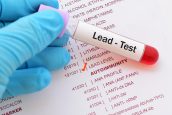Monmouth County NJ Lead Poisoning Attorneys
Due to the highly toxic nature of lead and the many health consequences that can result from lead exposure, the manufacture and use of products containing lead has been banned in the United States for decades. Both federal and state regulations are in place to restrict lead in building materials and consumer products, with inspections and mandatory disclosures that are strictly enforced. In New Jersey, apartment owners and landlords are required to undergo lead inspections, to remove lead from identified surfaces, and to disclose the presence of lead to tenants who occupy their buildings. Unfortunately, all to often, builders and property owners place their financial interests ahead of the health and well-being of those whom they are required to protect from lead-based health hazards. As a result, New Jersey is among the leading states in the Northeast with regard to lead poisoning rates, according to a 2008 report issued by the New Jersey Public Advocate’s Office.
When unsuspecting individuals and their families suffer health problems as a result of exposure to lead, they are provided with legal recourse through premises liability litigation. With the help of an experienced New Jersey personal injury attorney, you can obtain compensation for medical expenses, the cost of relocation, necessary future accommodations, lifelong disability, and even wrongful death. At Chamlin, Uliano & Walsh, our firm goes beyond that of a traditional business. We view your family as a part of our own. As such, we refuse to accept anything less than we would for our own mothers, brothers, sisters, and children. We will conduct a thorough investigation of your case, construct a comprehensive and compelling claim in your favor, and aggressively advocate on your behalf to achieve the compensation you deserve. As far as our fees our concerned, we don’t charge you a dime until you receive an award. To learn more, contact our offices in Monmouth County today at 732-440-3950 for a free consultation.
Common Sources of Lead in New Jersey
Lead can originate in a vast array of products and materials. However, it is commonly found in the following:
- Paint in older buildings (circa prior to 1978)
- Dust, flakes, fumes, and debris from paint that was improperly removed
- Water pipes and drinking water
- Consumer products including children’s toys and jewelry
- Imported canned food and candy
- Gasoline tanks and the surrounding soil
- Mining, smelting, refining or manufacturing workplaces and nearby residential areas
Children and Lead Paint in New Jersey Homes
In 1978, the United States Consumer Product Safety Commission outlawed the use of lead-based paint in residential housing. What they failed to do, however, was mandate the removal of lead-based paint from surfaces that had been previously covered with the toxic substance. As a result, numerous homes in the U.S. that were built before 1978 still bear the remnants of lead paint. This reality has led to countless cases of lead poisoning, the most common victims of which are children.
According to the Center for Disease Control (CDC), over 4 million households in the U.S. currently leave children exposed to toxic amounts of lead and approximately 500,000 children between the ages of 1 and 5 already have dangerous amounts of lead in their bloodstreams. In October of 1991, the Centers for Disease Control (CDC) defined the criteria for toxicity as a blood level that meets or exceeds 10 micrograms per deciliter (mcg/dL).
The primary phenomenon that contributes to the high rates of lead poisoning in children involves the sweet taste of lead paint and its propensity to flake, chip, and produce debris that are easily inhaled or ingested. As lead paint ages, it tends to peel and chip, resulting in dust, fumes, flakes, and powder residue that children often breath in, eat, or suck on. This toxic lead exposure can lead to a host of medical consequences, some of which result in permanent problems for innocent children.
Medical Effects of Lead Poisoning
As mentioned above, exposure to lead can result in a wide variety of health problems, and in the worst cases, even death. Lead often has catastrophic effects on the brain and peripheral nervous system, as well as the kidneys, liver, spleen, endocrine, and immune systems. In children, lead poisoning can manifest in the following symptoms:
- Learning difficulties and developmental delays
- Behavioral problems
- Slowed or stunted growth
- Visual, hearing, or functional impairments
- Organ damage
In both adults and children, lead poisoning may result in symptoms including:
- Weight loss and loss of appetite
- Abdominal pain
- Vomiting
- Constipation
- Fatigue
- Memory loss
Adults who are exposed to toxic amounts of lead may also experience joint pain, cardiovascular issues, and sterility.
Negligent Parties in Lead Poisoning Claims
A toxic lead exposure lawsuit can be brought against any party whose negligence may have resulted in lead poisoning. This includes individuals and companies such as:
- Landlords
- Property owners
- Property management companies
- Contractors
- Builders
- Government entities
- Municipalities
Your South Jersey Attorneys for Lead Poisoning Lawsuits
Our personal injury team fights for lead poisoning victims and their families throughout South Jersey, from Eatontown to Asbury Park, Belmar to Manasquan, and Freehold to Middletown. Contact our offices in Monmouth County today to discuss your case and learn more about your legal options.

